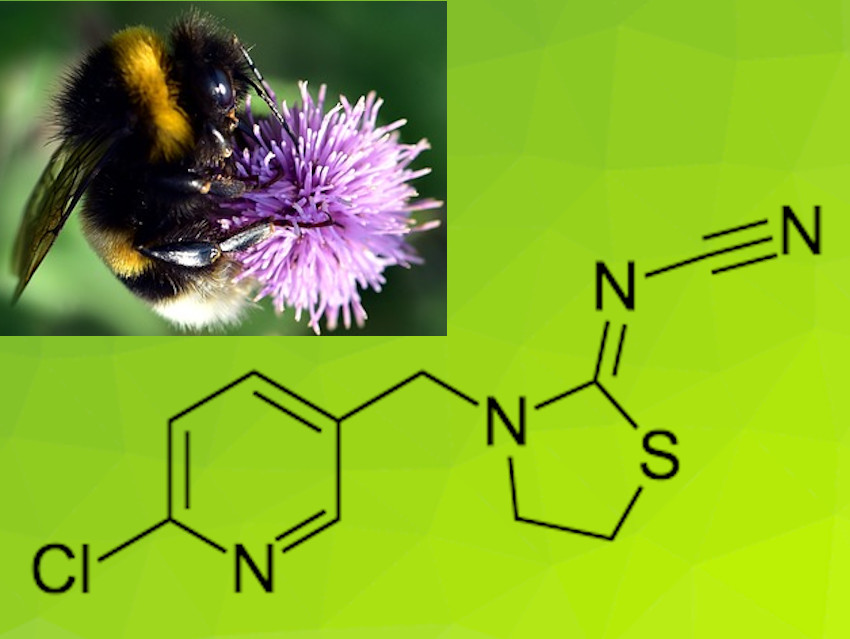In recent years, a decline of pollinating insect populations has been observed. Food sources for bees have become scarcer and pesticides threaten foraging insects. Neonicotinoids are an important class of insecticides in modern agriculture. They are, however, considered particularly problematic. Some members of this insecticide class have been banned in the European Union due to their harmful effects on bees. Mass-flowering crops like clover can provide food resources for insects, but their efficient cultivation often requires pesticide use.
Maj Rundlöf, Lund University, Sweden, and Ola Lundin, Swedish University of Agricultural Sciences, Uppsala, have examined the development of bumblebee colonies placed either near red clover fields treated with the neonicotinoid insecticide thiacloprid (pictured), near untreated organic clover fields, or in landscapes without clover fields. The study was carried out over three years. The researchers analyzed the growth and reproduction of the bumblebee colonies and monitored the use of red clover as a food source by examining the pollen carried by the bumblebees. Levels of thiacloprid and other trace neonicotinoids were determined by liquid chromatography–mass spectrometry (LC-MS) analysis of extracts from pollen samples.
The team found no adverse effects of thiacloprid use on the growth and reproduction of the bumblebees. Treated clover fields were actually visited more frequently by the bumblebees than untreated ones. The researchers assume this to be due to higher nectar production by clover plants less affected by pests. Similar results had been obtained in a previous study using white clover [1]. However, adverse effects were found in another study using the pesticide clothianidin [2]. This indicates considerable differences between the neonicotinoids regarding their dangers to pollinating insects.
The thiacloprid exposure in this study remained beneath the level that causes reproductive damage in bumblebees. These low quantities were, however, sufficient to decrease the crop pest load by 90 %. These findings indicate that moderate use of the less harmful neonicotinoids might not harm bumblebees and could actually benefit crop pollination. Further studies are necessary to provide conclusive evidence.
- Can Costs of Pesticide Exposure for Bumblebees Be Balanced by Benefits from a Mass-Flowering Crop?,
Maj Rundlöf, Ola Lundin,
Environ. Sci. Technol. 2019.
https://doi.org/10.1021/acs.est.9b02789
References
- [1] The role of pollinators, pests and different yield components for organic and conventional white clover seed yields,
Ola Lundin, Glenn P. Svensson, Mattias C. Larsson, Göran Birgersson, Veronica Hederström, Åsa Lankinen, Olle Anderbrant, Maj Rundlöf,
Field Crops Res. 2017, 210, 1–8.
https://doi.org/10.1016/j.fcr.2017.05.014 - [2] Seed coating with a neonicotinoid insecticide negatively affects wild bees,
Maj Rundlöf, Georg K. S. Andersson, Riccardo Bommarco, Ingemar Fries, Veronica Hederström, Lina Herbertsson, Ove Jonsson, Björn K. Klatt, Thorsten R. Pedersen, Johanna Yourstone, Henrik G. Smith,
Nature 2015, 521, 77–80.
https://doi.org/10.1038/nature14420



